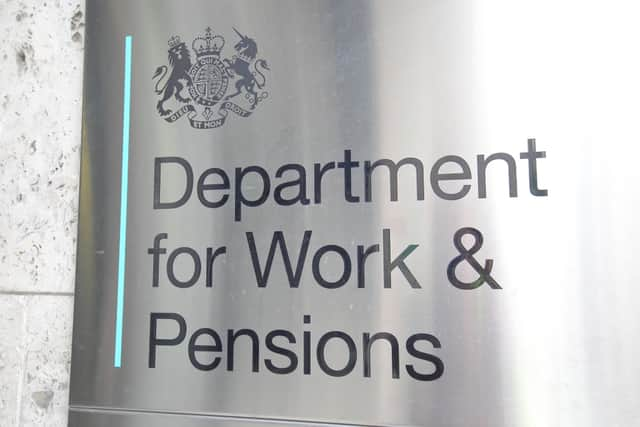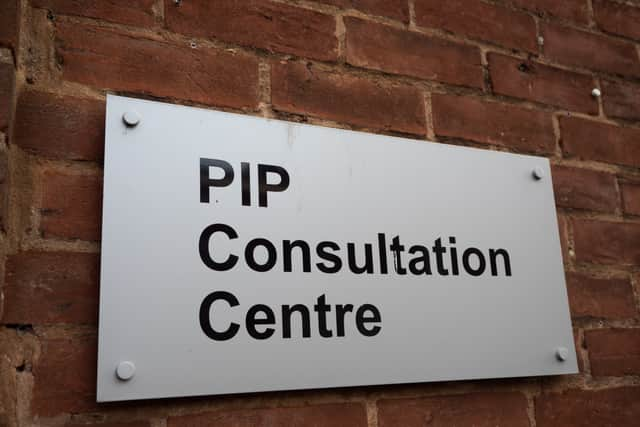DWP PIP claim: Personal Independence Payment explained as applicants could be due £15,000 in back payments
This article contains affiliate links. We may earn a small commission on items purchased through this article, but that does not affect our editorial judgement.
and live on Freeview channel 276
In 2020, the Department for Work and Pensions (DWP) outlined the changes it would be making to the Personal Independence Payment (PIP) process which decided the level of financial support awarded to claimants.
The DWP has now announced that a new review is underway following a change in PIP law to the definition of “social support” which was introduced from April 2016.
This is everything you need to know.
What is PIP?
Advertisement
Hide AdAdvertisement
Hide AdPIP is financial support designed to help with the extra living costs if you have both:
- A long term physical or mental health condition or disability
- A difficulty doing certain everyday tasks or getting around because of your condition
You are still able to receive PIP even if you have a job, have savings or are getting other benefits.
There are two parts to PIP:
- A daily living part, if you need help with everyday tasks
- A mobility part, if you need help with getting around
Whether you get one or both parts and how much you get will depend on how difficult you find everyday tasks and getting around.
You might get the daily living part if you need help with tasks like preparing food, using the toilet, managing your medicines and socialising around other people. You may get the mobility part if you need help with things like physically moving around and leaving your home.
Advertisement
Hide AdAdvertisement
Hide AdYou do not have to have a physical disability to receive the mobility part of PIP. You might also be eligible if you have difficulty getting around due to a cognitive or mental health condition, such as anxiety.
What changes were made to PIP?
From 6 April 2016, there was a law change in how the DWP considers the need for social support, when engaging with others face to face, as part of the PIP assessment process.
The DWP says: “If someone needs ‘prompting’, by way of reminding, encouraging or explaining, from a person trained or experienced in assisting people in social situations, we now consider whether this is ‘social support’.
“The change also clarifies that social support is an ongoing need to help engage with other people. It does not need to be during or immediately before the activity.”
Advertisement
Hide AdAdvertisement
Hide AdFor those who did not receive the daily living component of PIP, or had their PIP claim turned down, this change means that they could be eligible for backdated standard rate payments worth up to £15,000.
Who is affected by the new review?
The DWP says that it is looking at PIP claims from those who might be affected by the change, which includes looking again at some claims that were determined on or after 6 April 2016, where PIP was awarded because of needing “prompting” to engage with people face to face.
The DWP will not consider whether they needed “social support”, and this includes some claims where PIP was not awarded.


The DWP will not look again at claims if:
- The enhanced rate of daily living part of PIP has been awarded continuously since 6 April 2016
- A Tribunal has made a decision on your claim since 6 April 2016
- A decision not to award you PIP was made before 6 April 2016
“Not everyone will be eligible. If you are, we will write to you and you do not need to contact us. It may take some time for you to get this letter. We are not planning to invite you for an assessment as part of this review, but we may contact you for more information,” the DWP states.
Advertisement
Hide AdAdvertisement
Hide AdIf it is decided that you should get more PIP, your award will usually be backdated to 6 April 2016.
If you started claiming PIP after 6 April 2016, then your award will usually be backdated to the date you started getting PIP.
How do I apply for PIP?
Before you apply for PIP, you’ll need to check if you’re eligible first.
You can get PIP if all of the following apply to you:
- You’re 16 or over
- You have a long-term physical or mental health condition or disability
- You have difficulty doing certain everyday tasks or getting around
- You expect the difficulties to last for at least 12 months from when they started
You must also be under State Pension age if you’ve not received PIP before.
Advertisement
Hide AdAdvertisement
Hide AdTo apply for PIP you usually need to have been living in England, Scotland or Wales for at least the two of the last three years, and also be living in one of these countries when you apply. You can read more about applying for PIP if you live in Northern Ireland on the Northern Irish Government website.


To claim PIP, you’ll need to call the PIP New Claims line to begin the process, on 0800 917 2222. The phone line is open from Monday to Friday, 8am to 5pm.
When you call, you’ll need to give the following information:
- Your contact details, like a telephone number
- Your date of birth
- Your National Insurance Number, if you have one - you can find it on letters about tax, pensions and benefits
- Your bank or building society account number and sort code
- Your doctor or health worker’s name, address and phone number
- Dates and addresses for any time you’ve spent in a care home or hospital
- Dates for any time you spent abroad for more than four weeks at a time, and the countries you visited
You’ll then be sent a form that asks about your condition, usually within two weeks.
Advertisement
Hide AdAdvertisement
Hide AdYou’ll need to complete and return the form. Include any supporting documents if you have them, such as prescription lists, care plans or information from your doctor.
An assessment may be required if more information is needed. You’ll be asked about how your condition affects your daily living and mobility tasks and any treatments you’ve had or will have.
You may also be asked to do some simple movements to show how you can manage some activities. The assessment can be in person, over the phone or by video call, and usually lasts an hour.
Lastly, you’ll get a letter with a decision on whether you’ll get PIP and the date of your first payment if your claim has been successful.
Advertisement
Hide AdAdvertisement
Hide AdYou can challenge a decision about your claim. This is called asking for ‘mandatory reconsideration’.
You can read more about challenging the decision on the Government website.
A message from the editor: Thank you for reading. NationalWorld is a new national news brand, produced by a team of journalists, editors, video producers and designers who live and work across the UK. Find out more about who’s who in the team, and our editorial values. We want to start a community among our readers, so please follow us on Facebook, Twitter and Instagram, and keep the conversation going. You can also sign up to our newsletters and get a curated selection of our best reads to your inbox every day.
Comment Guidelines
National World encourages reader discussion on our stories. User feedback, insights and back-and-forth exchanges add a rich layer of context to reporting. Please review our Community Guidelines before commenting.
